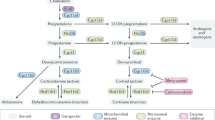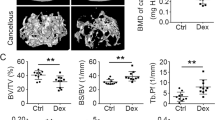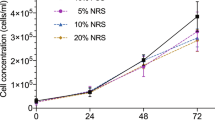Abstract
WE have found that removal of the pituitary from rats decreases their susceptibility to leukaemia induced by Gross virus. This provides preliminary support for our hypothesis that the pituitary through one of its hormones, is involved in leukaemogenesis.
This is a preview of subscription content, access via your institution
Access options
Subscribe to this journal
Receive 51 print issues and online access
$199.00 per year
only $3.90 per issue
Buy this article
- Purchase on Springer Link
- Instant access to full article PDF
Prices may be subject to local taxes which are calculated during checkout
Similar content being viewed by others
References
Gross, L., Oncogenic viruses (Pergamon, New York, 1970).
Nagareda, C. S., and Kaplan, H. S., J. natn. Cancer Inst., 16, 139 (1955).
Fabris, N., Pierpaoli, W., and Sorkin, E., Clin. exp. Immun., 9, 227 (1971).
Author information
Authors and Affiliations
Rights and permissions
About this article
Cite this article
BENTLEY, H., HUGHES, E. & PETERSON, R. Effect of hypophysectomy on a virus-induced T-cell leukaemia. Nature 252, 747–748 (1974). https://doi.org/10.1038/252747a0
Received:
Issue Date:
DOI: https://doi.org/10.1038/252747a0
This article is cited by
-
Growth hormone therapy and leukaemia
European Journal of Pediatrics (1989)
-
Wilms tumour in a patient with growth hormone replacement therapy
European Journal of Pediatrics (1989)
-
Lack of mitogenic effects of growth hormone on human leukemic lymphoblasts
European Journal of Pediatrics (1987)
Comments
By submitting a comment you agree to abide by our Terms and Community Guidelines. If you find something abusive or that does not comply with our terms or guidelines please flag it as inappropriate.



